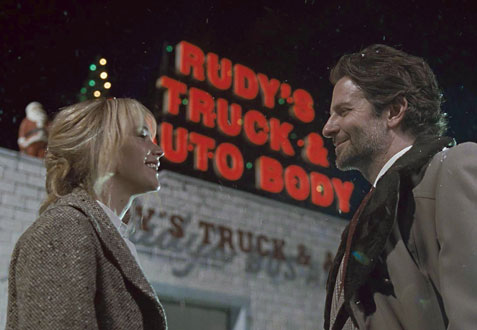
David O. Russell has developed a repertory of players akin to “American Horror Story” creator Ryan Murphy. Including Russell’s new film “Joy,” Jennifer Lawrence, Robert De Niro and Bradley Cooper have been in each of his last three films, while Christian Bale, Amy Adams and Elisabeth Rohm have been in two of his last four. Russell had some hiccups with actors early in his career (George Clooney and Lily Tomlin come to mind), so it’s nice to see that Russell has found the balance between the directorial process and ego management, and that is crucial to a director’s continued success. If you have a reputation for treating actors poorly, you will no longer have good actors auditioning for your films, or accepting your calls.
With “Joy,” Russell has a motherlode of talent ready to carry the weight, but his own script undercuts them. It begins with an “American Hustle”-style bolt of adrenaline, but it quickly shifts into ‘kick the shit out of Joy’ mode for the rest of the movie. Joy is dealt a terrible hand, and the movie’s message seems to be that that is why she became a success, that it was her awful family that gave her the drive to succeed. So for you parents out there who are encouraging their kids to think positive and believe in themselves, we’re all clearly doing it wrong. If you want your kids to be super-rich, you clearly have to raise them to be sociopaths.
Joy (Lawrence) was encouraged at an early age by her grandmother (Diane Ladd) that she was meant to use her creativity to do greater things for her horribly broken family. She has a half-sister Peggy (Rohm) from her father Rudy’s (De Niro) first marriage, and by the time Joy married singer Tony Miranne (Edgar Ramirez), Rudy was on his third marriage, which of course ended in divorce. Now divorced herself with two kids, Tony living in the basement, and her mother (Virginia Madsen) watching soap operas nearly nonstop, Joy has yet to act on her promise, until a moment on the boat of Rudy’s new girlfriend Trudy (Isabella Rossellini) gives Joy the idea of a lifetime: a mop that people can clean without touching the strands. Joy draws it up with the help of her daughter, and meets nothing but disapproval and resistance from the people who have nothing to lose, and everything to gain, from her success.
Joy, however, is persistent. Tony arranges a meeting with Neil Walker (Cooper), who runs the relatively new shopping channel QVC, and Neil is dazzled by her product. He asks if she can have 50,000 of them ready by the following week. She, of course, says yes, even though she has no idea if she can actually do it. Each subsequent victory in Joy’s life is met with a series of crushing defeats, and her family members are the first to tear her down, even though Rudy is responsible for the lion’s share of her troubles.
The truly impressive thing about Lawrence’s performance in this film is the Zen calm she maintains. There are two moments where she loses her shit, but otherwise she handles all of the bad news and verbal abuse ridiculously well, considering Joy’s age and the pressure she’s under. Most of the performances that are awarded by the Academy are showy, and Lawrence has benefited from that as well, at least with her last two Oscar nominations. Here, though, she seems to be challenging the Academy to look deeper, as opposed to rewarding the person who does the most acting, but not the best. Lawrence is 25 years old, and eyeing a fourth Oscar nom. It’s scary to think that we may never see another actress like her in our lifetime.
With any luck, Rohm’s profile is about to get a boost, because this is hands down the best work she’s ever done. The way she looks at Joy – or more accurately, the way she looks through her – is withering. De Niro’s Rudy feels like a second cousin of his character in “Silver Linings Playbook,” in that both are terrible parents and generally not good people. The costumes, though, are priceless. The film deserves an Oscar nomination for Madsen’s glasses alone.
The most baffling thing about “Joy” is how Russell wasn’t able to balance the joy (yep, I went there) and pain in his narrative. “American Hustle” had a non-linear timeline just like this one does, yet had no such trouble meeting each setback with a new opportunity for things to get better. Here, Russell begins with some crazy soap opera scenes (something that is called back to diminishing effect throughout the film), throws in one adrenaline-fueled flashback of the time when she and Tony first met, fell in love, married, and divorced, but for the rest of the film, he seems so hell-bent on milking the irony of the film’s title that he loses sight of how unbalanced it all is.
Related Posts
Comments Off on Movie Review: “Joy”
Posted in: Entertainment, Movie Reviews, Movies
Tags: Bradley Cooper, David O. Russell, Jennifer Lawrence, Robert De Niro
















